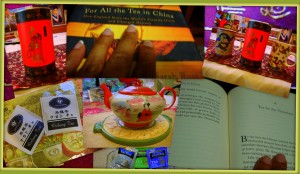
Legend has it that I was a great tea drinker since I was a little girl. An older cousin told me that my grandfather had a little cup and saucer for me and whenever I went to visit, he would make tea for me. To this day, I love tea.
My friends recently came back from China after a visit to show off their new Canadian born baby to parents and grandparents. I received a call on Tuesday asking if they could drop by as they brought something from China for me. In this pretty gift bag was a beautiful red and gold container with tea. They told me that this was one of the finest teas and it was a red variety.
I love my friends so much for thinking of me and bringing this present back with them. Although I don’t like anything better than sitting with a good cup of tea, this tea is more special to me than any other tea because it represents their love and care for me. At this time of life, these things mean a lot to me.
The botanical name for tea is “Camellia sinensis.” We often think of the British as the great tea drinkers and with their “high teas” and fine chinaware, we tend to forget that we owe China a debt of gratitude for this fine brew. I borrowed a book from the library yesterday which tells the story of how Robert Fortune from Britain obtained botanical samples in China and shipped them back to the British East India Company in India and also to England. It makes for very good reading and is called “For All the Tea in China.” The author is Sarah Rose.
I also found this review on Amazon:
If ever there was a book to read in the company of a nice cuppa, this is it.” –The Washington Post
In the dramatic story of one of the greatest acts of corporate espionage ever committed, Sarah Rose recounts the fascinating, unlikely circumstances surrounding a turning point in economic history. By the middle of the nineteenth century, the British East India Company faced the loss of its monopoly on the fantastically lucrative tea trade with China, forcing it to make the drastic decision of sending Scottish botanist Robert Fortune to steal the crop from deep within China and bring it back to British plantations in India. Fortune’s danger-filled odyssey, magnificently recounted here, reads like adventure fiction, revealing a long-forgotten chapter of the past and the wondrous origins of a seemingly ordinary beverage.
This collage was inspired by this lovely and thoughtful gift of Chinese tea from these special friends. This Late Bloomer is going to have a “cuppa” tea now. Isn’t it nice that tea is good for everyone – Late Bloomers and Early Bloomers alike?
